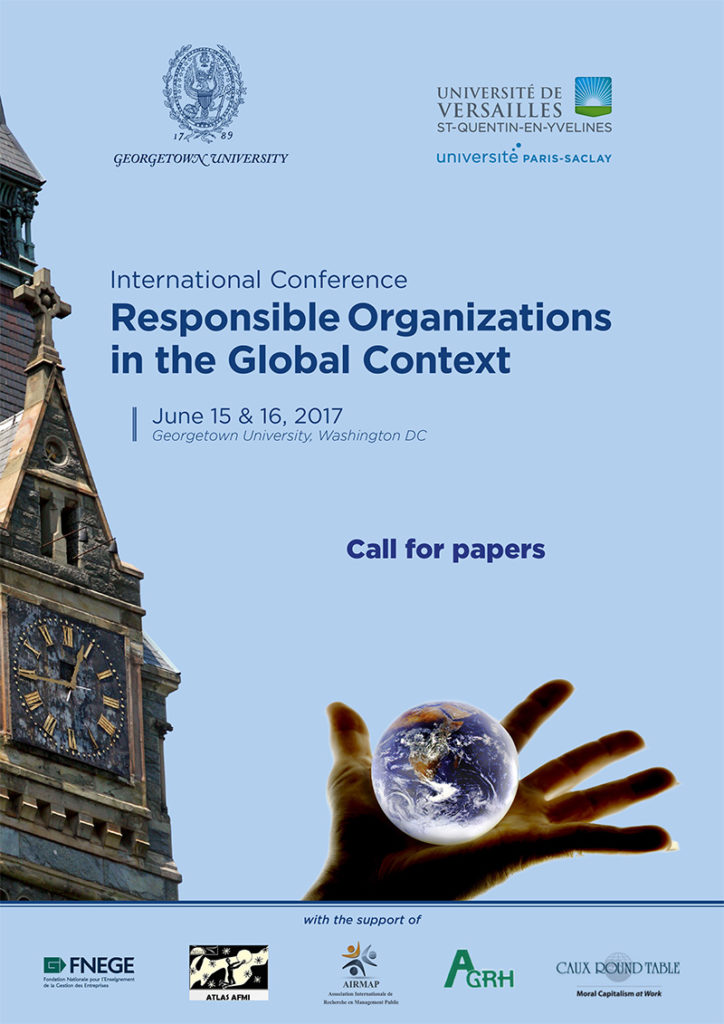Appel à communication « Responsible Organizations in the Global Context » – 15&16/06/2017- Georgetown University
International Conference “Responsible Organizations in the Global Context”
Dates: June 15 & 16, 2017
Location: Georgetown University, Washington DC
More information at: http://www.larequoi.uvsq.fr/larequoi/langue-fr/international-conference-rogc-juin-2017/
Call for papers
Submission deadline for abstracts : January 8, 2017
The LAREQUOI Research Center for Management of the University of Versailles (France) and the Center for Intercultural Education and Development (CIED) of Georgetown University (Washington DC, USA) are coorganizing an international conference on “Responsible Organizations in the Global Context”. The conference aims to engage reflective thinking and discussion on the various dimensions and impacts of “responsibility” for organizations (companies, institutions, government…), while taking into account international differences and similarities, as well as global challenges.
Organizations, both public or private, are expected to be managed in order to carry out their mission in accordance with the expectations and interests of their main stakeholders. If management can be defined as a set of processes and methods used to pilot any form of organization, it can also be broken down into a wide variety of modalities, from comprehensive and meaningful approaches, to technocratic and dehumanized tools. All of these different approaches could be considered forms of management, some being quite responsible and others unaccountable. Moreover, they can be found both in market enterprises and inpublic and non-profit entities.
The combination of responsibility, organizations, and management is not a new trend, and a number of authors have long emphasized the relationship among these concepts. Such a link seems even more crucial today, in an era of profound uncertainty, globalization, and somewhat contradictory expectations regarding social, economic, and political requirements.
Moreover, with the development of digital technology and the use of data mining, new questions regarding ethics and responsibility are raised today. Indeed, big data and digital tools can bring significant benefits to both individuals and organizations, but at the same time they question the meaning of privacy in our society, and they highlight the risk of manipulation oriented on profit rather than on the stakeholders’ interests.
In this context, analyzing dimensions of responsible organizations in the global perspective is essential, in view of both the intensifying pressures of international competition and the growing crisis of confidence towards some management concepts and practices. Indeed, socio-economic and political systems are facing many societal challenges that are difficult to cope with, and management methods are more and more questioned.
They are regularly suspected of serving particular interests instead of the public good. Consequently, more accountable and integrated processes might be appropriate in order to deal with the present and future stakes of our society.
The theories and practices of organizations generally lead to a distinction between responsibility and accountability, the first being more related to assuming the charge of something or someone, and the second to the necessity to report and/or explain one’s actions. Both concepts seem necessary and complementary, and might also be brought together with sustainable development, either at the corporate level or for global society.
The conference will approach the subject of “Responsible Organizations” from several perspectives: an international perspective, through analyses made in different countries or via comparative approaches; an institutional perspective, studying both commercial businesses and public or non-profit organizations; and a professional perspective, by combining the outlooks of researchers and practitioners.
Within this framework, the concept of “Responsible Organizations” can include dimensions of corporate social responsibility (CSR) as well as internal management processes, such as the quality of human resource policies and leadership skills, seen as key assets for global performance. The possible synergy between the interests of diverse stakeholders employees, shareholders, government, customers, partners, sponsors, communities, society, etc. – and global corporate performance, which has been studied for quite a long time, will be raised and examined.
Concepts such as sustainability, corporate citizenship, and ethics will be part of the discussions, since they can be considered as essentiel ingredients of the organizational processes and missions.
The particular role of managers, either in public or in private organizations, can also serve as a major topic of discussion, insofar as responsible leadership could be generated and reinforced both by management systems and individual skills and actions. Indeed, managers and/or leaders are supposed to assume responsibility for organizational outcomes as well as for the processes and people they work with.
Additional research topics such as individual and collective behaviors, awareness regarding communication, relationships between ethics and performance, cultural diversity, and social responsiveness can also be related to the challenges, the limits, and the possible benefits of responsible organizations.
Some possible topics and research questions :
- Various dimensions of “Responsibility” for companies, institutions and organizations :
- Managerial dimensions (human resource policies, organization and structure, style of leadership, quality
processes…) - Societal dimensions (citizenship, CSR, human rights, sustainable development, employment, education…)
- Managerial dimensions (human resource policies, organization and structure, style of leadership, quality
- New trends regarding business ethics and corporate social responsibility (CSR)
- International challenges and responsibility in organizations
- Ethical implications of big data and data mining
- Risks and sense of digital management
- Impact of national cultures on ethics and CSR
- Analysis of responsibility toward particular stakeholders
- Accountability and/or responsibility in organizations ?
- Corporate social responsibility and sustainable development
- Cultural acceptance of responsibility in organizations
- Management skills regarding ethics and social responsibility
- Role of managers in business responsibility
- Responsible organizations and communication processes
- Responsibility and ‘sensemaking’ in organizations
- Public policies and responsability
- Responsibility in particular contexts :
- Government
- Non-profit organizations / NGOs…
- B Corps
This list is not restrictive. Other topics related to stakes and challenges for organizations, at present or in the future,
will also be considered.
SUBMISSION PROCEDURE
Abstracts of no more than 800 words should be submitted by January 8, 2017, via email at the following address :
rogc.conference@georgetown.edu
Each proposal must contain the email subject line «Proposal for abstract».
The proposals should include: title of the paper; abstract of no more than 800 words (a clear presentation of the subject addressed, the research question, the theoretical context, the methodological approach, etc.); 3 to 5 key words; bibliographic references, etc. Please mention on a separate page: author(s) name(s), professional a fliation(s), postal address and email address of one author, and a reminder of the title of the paper.
Both individual and group submissions are welcome. The conference will be conducted in English. All proposals and papers will be required in English. Submissions will be reviewed by the Scientific Committee. The result of the selection will be communicated to the authors around February 12, 2017. Selected authors will have until May 7, 2017 to submit their full paper, according to the following instructions : maximum 40 000 characters (including spaces), accompanied with a short abstract of 120 words and 3 to 5 key words. The typography required is Times New Roman, size 12.
The tables, figures, diagrams, must be numbered and titled. Footnotes must be placed on their respective pages (not endnotes) and should not be too long. Citations are formulated in-text,
in parentheses (Name, year). Bibliographic references are gathered in an alphabetical list at the end of the paper. The full paper must be sent via email at the following address : rogc.conference@georgetown.edu. Each email must contain the subject line «Full paper».
Contact : rogc.conference@georgetown.edu
Websites: cied.georgetown.edu
http://www.larequoi.uvsq.fr/larequoi/langue-fr/international-conference-rogc-juin-2017/
Registration at : responsible-org-conference.eventbrite.com



